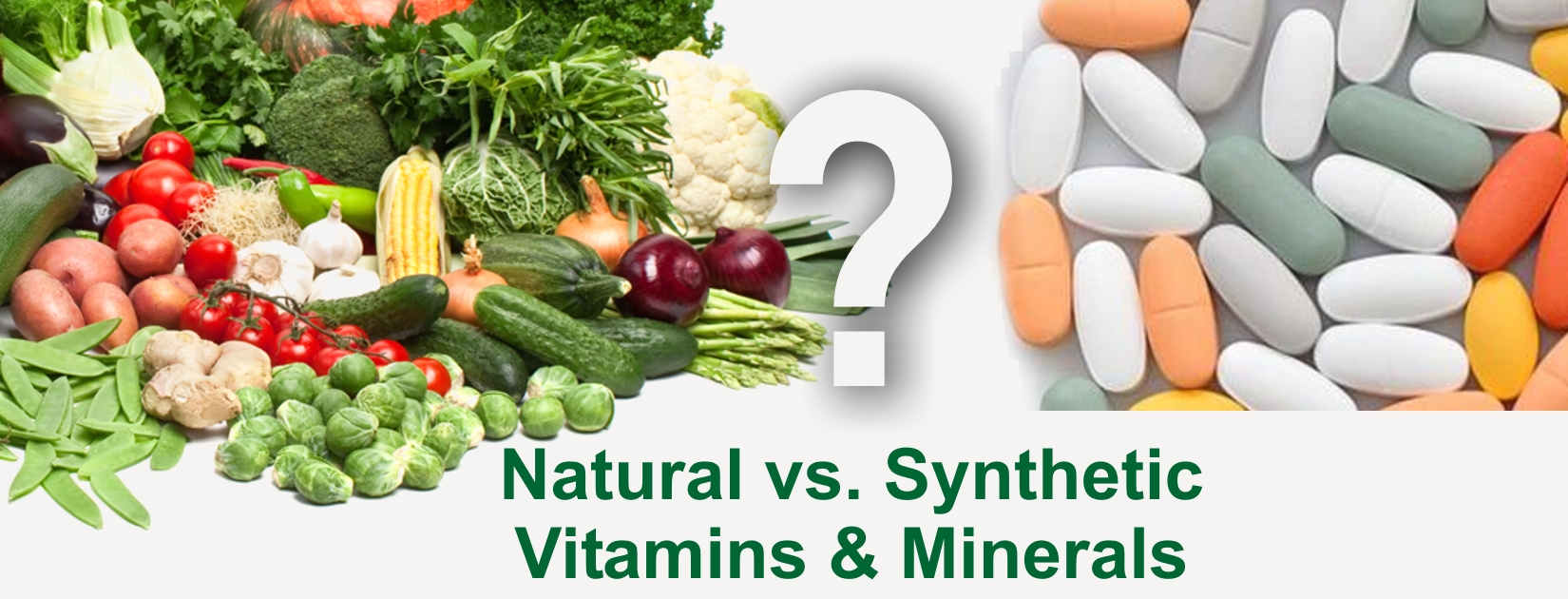NATURAL VS. SYNTHETIC…
IN WHICH WILL YOU PUT YOUR TRUST?

IN NATURE? OR IN MAN-MADE SYNTHETICS?
Probably never in history has so much money been spent on the advertising and the purchasing of any merchandise, with so little knowledge of the product itself on the part of either the seller or the buyer, as has been spent on "VITAMINS". Billions are being spent annually and most of the purchasers, jobbers, wholesalers, retailers or direct to the consumer salesmen do not know the difference between a SYNTHETIC, a CRYSTALLINE or a truly NATURAL vitamin. They know little of how they are made, their characteristics, their attributes, their sources, their advantages or disadvantages, and how to tell one from the other by reading the label. We want our Sonne´s retailers and consumers to know exactly what they are selling and buying.
A NATURAL vitamin - Means, as far as we are concerned, vitamins as found in natural foods, untampered with (not segregated, separated or isolated) in any way that might change their molecules, their biological or biochemical combinations, or their action. This usually means that only fiber and moisture are removed. Natural Food Vitamins are never highly concentrated. Nature is interested in BALANCE NOT POTENCY. This means that to get higher than normal potency NATURAL VITAMINS MUST BE CONSUMED IN GREATER QUANTITY. Synthetic and Crystalline vitamins lend themselves to high potency concentrations in a few small pills. Naturals must be used in greater quantity as you would with food.
CRYSTALLINE - Means it had a natural food as its original source but probably was treated with various high powered chemicals, solvents, heat, and distillations to reduce it down to one specific, pure, crystalline vitamin or amino acid. It is no longer natural. It no longer has its synergists (enzymes, coenzymes, minerals, mineral activators, and co-vitamin helpers). It has been reduced to a pure, simple, crystalline powder.
SYNTHETIC - Means that in the laboratory the scientist attempted to reconstruct the exact structure of the CRYSTALLINE molecule by "putting together" or chemically combining molecules from other known sources. Chemically, therefore, there is no difference between the Synthetic and the Crystalline. As a vitamin there is no difference between the two. The crystalline may have a slight advantage in that it is difficult to reduce any natural product to an absolutely pure state and some "impurities" might be naturally occurring thus giving a little added value to the Crystalline over the Synthetic. On the label for either Synthetic or Crystalline only the chemical name of the single vitamin is usually given. Legally it is not necessary to give the source from which the synthetic chemical is derived. Natural Vitamins build nutritionally – synthetics medically. Natural vitamins build slowly but exceedingly well as NATURE always does. Synthetics can give a quick spasmodic spurt that may not be lasting. Naturals are NONTOXIC in any consumable quantity. Some synthetics may be very toxic because they are not a genuine food. Finally, Naturals are much more expensive because they are perishable and every precaution must be taken to preserve their life and integrity. Synthetics are mostly "dead", inert, cheaper and present much less expensive handling problems. As with any inert material greater mass production creates cheaper bargain prices. All labels of truly NATURAL food concentrates should indicate the exact food source from which a vitamin is obtained.
WHEN COMPARING NATURAL CONCENTRATES WITH SYNTHETICS JUST REMEMBER...
- "There never was anything in the world that some man could not make a little worse and sell a little cheaper. Those people who consider price only are this man´s lawful prey." - John Ruskin
- "The bitter memory of poor quality remains long after the sweetness of cheap price is forgotten."
- GOD made naturals - MAN made synthetics. In which will you put your trust?
Note 1: Synthetics are so much cheaper that commercially they have actually replaced most crystallines. Only a few crystallines are commercially used, such as: (1) B12 (2) Alpha Tocopherol (partially replaced), and (3) Inositol.
Note 2: Legally a crystalline can be called natural because it was isolated from a natural product, but it is not natural as herein described.
MINERALS
Minerals are characterized as:
INORGANIC - The minerals as found in soils, rocks and chemicals. Some are obtained in pure crystal powder while others are unstable alone so are available only as a salt (i.e. combined with something else).
ORGANIC - These are minerals that have been organized by photosynthesis from the action of the sun, soil, air and water into plant life and thereby into animal tissue.
COMMENT: Every factor needed in human nutrition (except vitamin D and water) that has ever been isolated by scientific man from any vegetation is found in GreenLife® on our label we state "as found in GreenLife®," or as "analyzed from GreenLife®," or as "naturally occurring in GreenLife®." Our potencies are small compared to Synthetics and Crystallines, but they are in Nature's own balance. They carry their own Synergists (minerals, mineral activators, enzymes, coenzymes, amino acids, vitamins, etc.), all closely balanced and bound together by Nature. They are "alive" and ready to function without chemically upsetting Nature's delicate balance in the human body. They are not a man made chemical drug.
For a more detailed breakdown of the vitamins and minerals most frequently found in food supplements, please request the pamphlet, "GreenLife® - Natural Vitamins - How To Read Labels."
